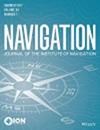ONCLE (One Clock Ensemble) for Galileo’s Next-Generation Robust Timing System
IF 2
3区 地球科学
Q1 ENGINEERING, AEROSPACE
引用次数: 3
Abstract
This paper presents the ONCLE (One Clock Ensemble) solution for the Galileo time and frequency reference system with advanced features in terms of robustness, performance, continuity, and simplicity. Each component clock is frequency-steered to the ensemble time, which itself creates an average of those steered clock outputs, while clock faults are detected and corrected in real time within an integrated system. The feasibility of algorithm and hard ware approaches has been demonstrated on an elegant breadboard and verified by an extended test and validation campaign at the Engineering Model (EM) level, developed for the Galileo next-generation onboard timing system under European GNSS Evolutions Program. Based on the progress for space application and the heritage on the Galileo ground precise timing facility (PTF), we propose a robust solution for the upgrade of PTF for ground application aiming to pro vide a fully continuous and performance-improved timescale under automated operation. The capability is demonstrated by preliminary simulation results.伽利略新一代鲁棒定时系统的ONCLE(一个时钟集成)
本文提出了伽利略时间和频率参考系统的ONCLE (One Clock Ensemble)解决方案,该方案在鲁棒性、性能、连续性和简单性方面具有先进的特点。每个组件时钟都被频率控制到集成时间,集成时间本身产生这些被控制时钟输出的平均值,而时钟故障在集成系统中被实时检测和纠正。算法和硬件方法的可行性已经在一个优雅的面包板上进行了演示,并通过工程模型(EM)级别的扩展测试和验证活动进行了验证,该测试和验证活动是为欧洲GNSS演进计划下的伽利略下一代机载授时系统开发的。基于空间应用的进展和伽利略地面精确授时设施(PTF)的传统,提出了一种用于地面应用的PTF升级的鲁棒解决方案,旨在提供自动化操作下的完全连续和性能改进的时间标度。初步的仿真结果验证了该方法的有效性。
本文章由计算机程序翻译,如有差异,请以英文原文为准。
求助全文
约1分钟内获得全文
求助全文
来源期刊

Navigation-Journal of the Institute of Navigation
ENGINEERING, AEROSPACE-REMOTE SENSING
CiteScore
5.60
自引率
13.60%
发文量
31
期刊介绍:
NAVIGATION is a quarterly journal published by The Institute of Navigation. The journal publishes original, peer-reviewed articles on all areas related to the science, engineering and art of Positioning, Navigation and Timing (PNT) covering land (including indoor use), sea, air and space applications. PNT technologies of interest encompass navigation satellite systems (both global and regional), inertial navigation, electro-optical systems including LiDAR and imaging sensors, and radio-frequency ranging and timing systems, including those using signals of opportunity from communication systems and other non-traditional PNT sources. Articles about PNT algorithms and methods, such as for error characterization and mitigation, integrity analysis, PNT signal processing and multi-sensor integration, are welcome. The journal also accepts articles on non-traditional applications of PNT systems, including remote sensing of the Earth’s surface or atmosphere, as well as selected historical and survey articles.
 求助内容:
求助内容: 应助结果提醒方式:
应助结果提醒方式:


